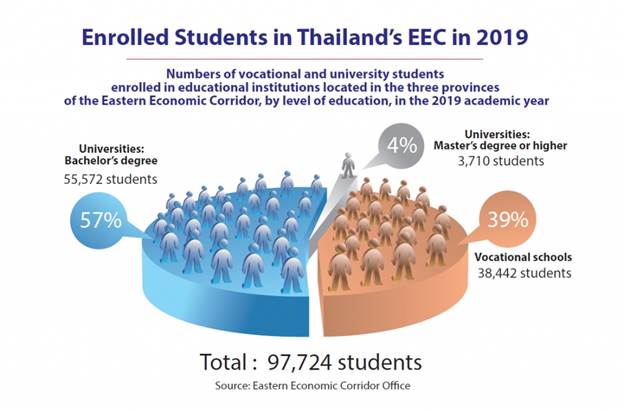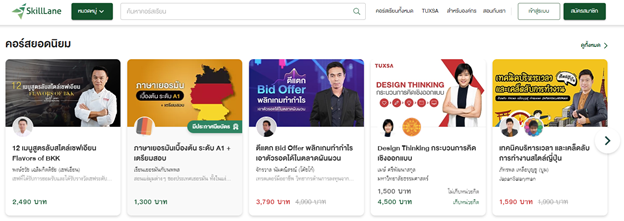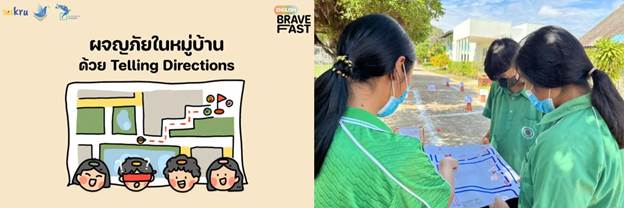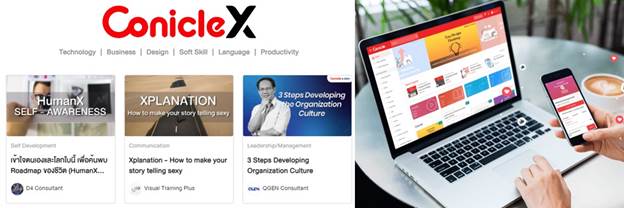– 'STEM-type talent development' to support Thailand's economic development
– Bangkok Trade Center held 'Science and Creative Talent Cultivation Camp' in Chonburi, a major EEC city
Thailand Education Policy Trends
The basic education curriculum in Thailand is 15 years, consisting of 3 years of kindergarten, 6 years of elementary education, 3 years of secondary education, and 3 years of higher education. Among them, compulsory education provided free of charge is 12 years from kindergarten to secondary education. As of 2021, there will be a total of 732 million students in basic education courses, accounting for about 11% of Thailand's population.
<The number of students in the Thai basic education course>

(Unit: million people)
[Source: Thailand Equity Education Fund (EEF)]
The Thai government recognizes the importance of education as a driving force for economic development, and intends to promote education policies in line with 'Thailand 4.0', a national economic development project. In particular, by encouraging STEM (Science, Technology, Engineering, Mathematics) education that encompasses science, technology, engineering, and mathematics, it plans to nurture talents suitable for the 21st century. In 2014, the National STEM Education Center was established under the leadership of the Institute for the Promotion of Teaching Science and Technology (IPST), and currently 13 centers are in operation across the country. Each center has designated up to six pilot STEM education schools to help apply the integrated science, technology, engineering, and mathematics curriculum. Local STEM education centers support offline education as well as online workshops for each grade level that fit the basic curriculum.
In 2017, the Thai Ministry of Education announced the 20-year National Education Scheme. For the sustainable development of education, it has established strategies such as improving access to education and eco-friendly education administration, and announced that it will work with each local basic education committee to strive for balanced regional development of education. In 2019, the Ministry of Higher Education, Science, Research and Innovation was newly established as a result of the merger of the Ministry of Science and Technology and the Office of the Higher Education Commissioner under the Ministry of Education. The establishment of the department was promoted in connection with the Eastern Economic Corridor (EEC), and supports the government's plan to build a manufacturing ecosystem in Thailand's Gulf by promoting industry-university cooperation.

[Source: EEC Secretariat (EECO)]
The Thai government is also striving to develop STEM education through international collaboration. The Southeast Asian Ministers of Education Organization (SEAMEO), a regional education-related pan-governmental organization to which Thailand is a member, seeks to develop a STEM education system suitable for the Southeast Asian region through public and private cooperation. Currently, Thailand is implementing the 'Chevron Enjoy Science Project' together with Chevron Thailand, an energy company, to support STEM education and job counseling for Thai students.
Thailand's leading education platform players
1. OpenDurian
As a company that provides lectures for entrance exams and language tests such as TOEIC and IELTS, it has 390 million registered members per year and has a cumulative audience of 4,800 million.

[Source: OpenDurian homepage]
2. Thai MOOCs
The Thailand MOOC, operated by the Thailand Cyber University (TCP) under the Ministry of Higher Education, Science, Research and Innovation, provides free lectures from scholars in Thailand as well as around the world.

[Source: Thai MOOC website]
3.SkillLane
It is an online lecture platform with the main content of upskilling lectures for office workers. In collaboration with universities, we also offer short-term online master's programs for 6 months.

[Source: SkillLane homepage]
4. InsKru
It is an educator network platform that shares learning ideas and know-how. The main users are elementary school teachers, and they can share their own learning games or activities and share student reactions and improvement plans with other teachers who borrow ideas.
<Example of shared learning ideas>

[Source: InsKru website]
5.Conicle
Through its own education platform 'ConicleX', it provides vocational education courses in various fields such as management, language, and design for private companies and office workers. AIS, PTT, SCG, KBank, etc. are using it as an employee training program in many large Thai companies.

[Source: Conicle website]
6.Vonder
As a company that provides short learning contents (Microlearning) and learning games (Gamification), it is also famous as a human resource management platform. Major services include 'Vonder Go!', a learning game platform for educational institutions, and 'Vonder Workplace', an HR platform for businesses.

[Source: Vonder website]
<Other online education platforms in Thailand>

[Source: @terrynut, Medium]
Korean education platform in Thailand
Megastudy and Maspresso are major educational platform companies that have entered Thailand. Megastudy, a large entrance exam company, established 'Mega EduTech' in Thailand in 2021 and entered the local online education market. Maspresso entered Thailand in 2020 with its AI-based problem solving app 'QANDA'. In the first week of its release, Qanda was the first in Thailand's Google Play Store education field.
<Local platform for Korean companies entering Thailand>
Note: (Left) Mega Study, (Right) Maspresso

[Source: each company website]
implication
Leang Lot Punful, chairman of Kasikorn Business Technology Group (KBTG), a subsidiary of Kasikorn Bank of Thailand, said that Kasikorn Bank and KBTG have invested in a total of 14 startups in the education sector, including SkillLane and InsKru. According to him, 50 hours of free lectures in programming and information science fields were provided last year alone due to Cassicon's investment in edutech. He emphasized that convergence-type talent nurturing is the basic driving force of economic development, and predicted that the demand for manpower will increase, especially in information science, social technology, and programming fields.
With the online transition of education accelerated by COVID-19 and the government's active support for STEM education, the Thailand education industry trend is likely to be led by 'online platform' and 'STEM' for a while. However, there are concerns that the education gap in Thailand, which has been large before, will widen due to COVID-19. According to a study by the Equitable Education Fund of Thailand, there are about 27 students nationwide who do not have the right environment for home-based classes, especially in cities near the southern and western borders. Thailand's Ministry of Education is promoting digital transformation and STEM education as well as promoting sustainable regional development.
By: KOTRA Bangkok Trade Center Yongeun Choi, Jaewon Park, Sarita Wongvijan
Source: Thailand Equity Education Fund, Thailand EEC Secretariat, Thailand Ministry of Education, each company website and local media, KOTRA Bangkok Trade Center’s own analysis data and data synthesis



